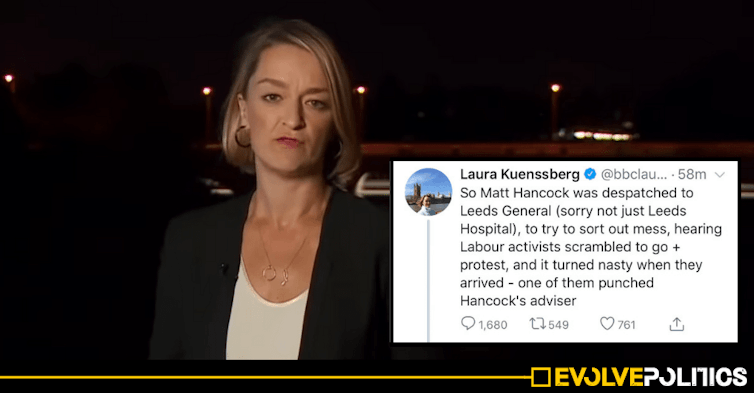
Richard Thomas, Swansea University and Declan McDowell-Naylor, Cardiff University
The final week of campaigning for the 2019 UK election began badly for the Conservative Party leader and incumbent prime minister, Boris Johnson. Confronted by an ITV reporter with a picture of four-year-old suspected pneumonia patient Jack Williment-Barr lying on the floor at Leeds General Infirmary, Johnson was so intent on ignoring the image that he took the reporter’s phone and put it in his pocket. The video of him doing so quickly went went viral.
Health Secretary Matt Hancock was sent to limit the damage, which was when the day began to deteriorate for some of the attending journalists. The BBC and ITV were among those reporting claims by “senior Conservative sources” that one of Hancock’s aides had been punched by an activist outside the hospital but video of the encounter later revealed this to be untrue.
BBC political correspondent Laura Kuenssberg subsequently apologised for erroneously tweeting news of the “assault” – as did her opposite number on ITV, Robert Peston:
Against this backdrop and the prime minister’s obvious discomfort that his bad news day was getting steadily worse, Johnson suggested that after the election he would review the BBC’s funding model, questioning whether such an approach “still makes sense” given the ways other media organisations are funded.
Subsequently, ITV’s Paul Brand tweeted anonymous No 10 sources proposing a move towards a US media system not requiring broadcasters to remain impartial:
The BBC licence fee is not immediately threatened – it remains in place until the Royal Charter expires in 2027. But removing it is not without precedent: Sweden, for example, changed how its public broadcaster is funded when it introduced a replacement tax based on personal income, in January 2019.
Alt-left emboldening PM?
Traditionally, the BBC is regarded as left wing by the right and right wing by the left and has perhaps taken comfort that this indicates balanced news coverage. But the Conservative Party has a traditionally feisty relationship with the BBC dating back, famously, to Margaret Thatcher’s fury over its coverage of the Falklands conflict. More recently, David Cameron threatened to “close down” the corporation during the 2015 election campaign.
But – more recently and less obviously outside the mainstream – relentless social media activity from a range of increasingly popular alt-left media websites has kept the BBC in the crosshairs throughout the campaign and might have provided the Conservatives with some cover. Given that the most recent Ofcom report notes that ITV and SKY News are perceived as marginally more trustworthy than BBC, then alt-left criticism might simply be fanning the flames of anti-BBC sentiment already emanating from the opposite side of the political divide.
Indeed our Cardiff/Swansea research examining the Facebook activity of alt-left media sites supports the notion that their critiques might be strengthening the prime minister’s resolve. Their collective seething at what they see as right-wing bias might be reinterpreted by the BBC’s critics as the public broadcaster being no longer fit for purpose.
In effect, left-wing media may have legitimised right-wing plans to abolish the licence fee.
Three big issues
We examined the most-shared posts on the Facebook pages of Another Angry Voice, Swawkbox, The Canary, Evolve Politics and Novara Media between November 24 and December 1. We focused on “shares” rather than comments or other reactions, since we surmise that sharing posts more likely signifies some level of agreement or endorsement.
As expected, various issues are discussed and shared, but there seems a consensus about the three big issues drawing the “alt-left” campaign focus away from Brexit, which unlike the Conservatives, Labour are still apparently uncomfortable in confronting. Notions that the Conservatives are racist and/or elitist and that the NHS is not safe in their hands are prominent – but the most compelling theme is media bias and, in particular, the performance of the BBC.
Skwawkbox was especially successful in widely distributing such content, with four posts criticising the BBC appearing in its ten most shared. Its post blasting the way the broadcaster dealt with Boris Johnson’s will-he-won’t-he interview with Andrew Neil for example, was shared more than 1,200 times.
The Canary’s critique was even more popular. Its claim that the BBC was “treating the public with utter contempt” by editing out the audience laughing at Johnson on Question Time was, according to the linked article by James Wright, “a new level of sinister statecraft”.
Two days later, The Canary’s criticism intensified, as another of their most shared posts alleged further editorial misdemeanours favouring the Conservatives.
Still a treasure?
For the BBC, remaining neutral when non-broadcast media are increasingly and unashamedly partisan is challenging. After such a tough time throughout this election, it will surely want to consider how to do better. But the news is not all bad.
Recent research carried out at Cardiff University concludes that, among other things, the BBC generally provides more hard news and “more policy information and analysis” than its commercial competitors. This underlines that while often critical of the way it does business, many would undoubtedly prefer to keep the BBC than move to the wholly commercial alternative model hinted at by the prime minister and his anonymous sources.
But with criticism increasing from both sides, perhaps the question for future elections is not whether the BBC will be able to perform better, but whether it is around next time to perform at all.

Richard Thomas, Senior Lecturer, Media and Communication, Swansea University and Declan McDowell-Naylor, Research Associate, School of Journalism, Media and Culture, Cardiff University
This article is republished from The Conversation under a Creative Commons license. Read the original article.